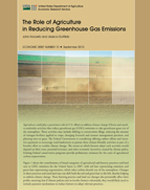The Role of Agriculture in Reducing Greenhouse Gas Emissions
by
John Horowitz and Jessica Gottlieb
Economic Brief No. (EB-15) 8 pp, September 2010
 Agriculture could play a prominent role in U.S. efforts to address climate change if farms and ranches undertake activities that reduce greenhouse gas (GHG) emissions or take greenhouse gases out of the atmosphere. These activities may include shifting to conservation tillage, reducing the amount of nitrogen fertilizer applied to crops, changing livestock and manure management practices, and planting trees or grass. The Federal Government is considering offering carbon offsets and incentive payments to encourage rural landowners to pursue these climate-friendly activities as part of a broader effort to combat climate change. The extent to which farmers adopt such activities would depend on their costs, potential revenues, and other economic incentives created by climate policy. Existing Federal conservation programs provide preliminary estimates of the costs of agricultural carbon sequestration.
Agriculture could play a prominent role in U.S. efforts to address climate change if farms and ranches undertake activities that reduce greenhouse gas (GHG) emissions or take greenhouse gases out of the atmosphere. These activities may include shifting to conservation tillage, reducing the amount of nitrogen fertilizer applied to crops, changing livestock and manure management practices, and planting trees or grass. The Federal Government is considering offering carbon offsets and incentive payments to encourage rural landowners to pursue these climate-friendly activities as part of a broader effort to combat climate change. The extent to which farmers adopt such activities would depend on their costs, potential revenues, and other economic incentives created by climate policy. Existing Federal conservation programs provide preliminary estimates of the costs of agricultural carbon sequestration.
Keywords: agricultural economics, climate change, conservation, greenhouse gas, emissions, carbon, land, methane, mitigation, agricultural practices
In this publication...
Charts and graphs (in .png format) from this report are available in the .zip file listed below. The .zip file also contains a document (readme.txt) that lists the name and title of each chart or graph file.
Need help with PDFs?
Order this Publication